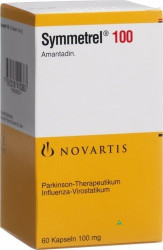Symmetrel (amantadine) Coupons and Discounts & Cost
Symmetrel (amantadine) is used as antiparkinsonian and antiviral agent. One way to save money on the Symmetrel (amantadine) retail cost regardless of income and insurance status is to use Symmetrel (amantadine) coupons or discount cards from RXCoupons. Use our Aamantadine coupons at your online pharmacy and receive up to 75% off the sale price each time you refill your prescription.
How does Amantadine work in your body?
Amantadine is used as antiparkinsonian and antiviral agent. The indications for Amantadine use include: - Parkinson's disease; - loss of consciousness due to head injury; - treatment of extrapyramidal disorders associated with taking medications (antipsychotics); - symptoms of hypokinesia and tremor; - herpes zoster caused by Varicella zoster.
Besides, Amantadine is used for the prevention and treatment of influenza A.
What are the contraindications for Amantadine?
Amantadine is unacceptable in the following cases: - liver failure; - psychosis; - chronic renal failure, chronic heart failure; - thyrotoxicosis; - if you have epilepsy; - if you have an ophthalmic pathology (particularly in angle-closure glaucoma); - prostatic hyperplasia; - high blood pressure.
Do not use Amantadine in delirious psychosis, during pregnancy (especially in the first trimester) and lactation. In addition, Amantadine should not be used with such drugs as triamterene and hydrochlorothiazide.
What is the usual dosage of Amantadine?
The single dosage of Amantadine for internal use is from 100 to 200 mg. The single dosage for intravenous infusion is 200 mg. Frequency and duration of the therapy is determined by the patient's response to treatment. The maximum dose should not exceed 600 mg per day.
Parkinson's disease: 1 tablet (100 mg) per day. The dose should be gradually increased to 100 mg twice a day, and this may be increased as necessary. The interval between doses should be at least 6 hours.
The tablets should be taken after meals. Patients should drink enough water (at least 2 liters per day). Due to the fact that this drug can affect CNS, it should not be used later than 4 pm. In renal insufficiency, the dose should be reduced and the intervals between doses should be increased.
Do not stop your therapy abruptly, as this may lead to a rapid deterioration of health.
Other antiparkinsonian drugs may increase the side effects of Amantadine. Thiazide diuretics may cause toxic effects, including ataxia, excitement, and hallucinations.
Amantadine can be used in pregnancy only under the doctor's direct personal supervision.
What are the side effects of Amantadine?
Nervous system: headaches, depression, visual hallucinations, irritability, mental disorders, dizziness, sleep disturbances, tremor.
Cardiovascular system: heart failure, orthostatic hypotension, arrhythmia, tachycardia.
Digestive system: anorexia, nausea, constipation, dry mouth.
Urinary system: difficulty with urination, polyuria.
If the patient has any undesired side effects, the treatment should be stopped gradually.
What are the symptoms of overdose?
Amantadine overdose symptoms may include urinary retention, acute psychosis, disorientation, visual hallucinations and aggressive behavior, respiratory failure and cardiac arrhythmia, coma.
Gastric lavage may be useful to delay the absorption of the drug and prevent additional toxicosis.
What are special instructions for Amantadine?
Amantadine should be prescribed with caution in patients with kidney disease, as well as in the elderly. Dosage adjustment might be necessary. Patients should not drink alcohol during the therapy.
Patients who experience nervousness, sleep disturbances, dizziness, convulsions, hallucinations, blurred vision should refrain from driving vehicles or performing work with potentially dangerous machinery.
Amantadine should not be given to children under 10 years.

